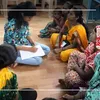How Shreni Samudaya is supporting weavers, artisans through peer-based occupational networks
Shreni Samudaya's networks connect and provide professionals across Karnataka with access to information and resources related to their area of work.
Over 80 percent of workers in India are employed in the informal sector, which provides minimal financial stability and job security.
For Sudhir Kamath, it came as no surprise the number of people joining the ‘larger informal sector’ was dipping.
From his conversations with workers, through his experience in the construction industry — he learned this was because the sector was not structured to have social status or a professional career path.
To help bridge this gap and pave the way for these workers to receive recognition and respect for their work, Sudhir founded Shreni Samudaya in 2018.
The idea was simple: create an occupational network that would connect people and enable knowledge transfer. In fact, the name comes from the ancient concept of ‘Shreni’ or trade guilds.
Having started as WhatsApp groups for different professions — including handloom weavers, wood inlay artisans, woodcarvers, carpenters, beauticians, etc. — these have now grown into proper digital and physical networks, where people discuss updates, supply, reselling, retailing, designs, promote, and more.

Based in Bengaluru, Shreni is currently operating on bootstrap funding and has networks in over 18 districts in Karnataka and beyond. They currently have 4,000 members on their online networks and access to 5,000 through interactions like events, workshops, and community trips.
“We work with ten different professions, majority of which are weavers,” Sumathi Nandakumar, Community Lead at Shreni Samudaya tells SocialStory.
These networks connect and provide professionals across Karnataka with access to information and resources related to their area of work.
The crux of the organisation is to improve the lives of informal sector workers through the knowledge of a peer-based network, explains Shivani Lalan, Operations Lead at Shreni Samudaya.
Citing examples of weavers, Shivani and Sumathi explain their work schedule is intensive, which involves a long production cycle. “They (weavers) are stuck in that cycle. Even if they want to look at an alternative, they don’t have any time,” Sumathi says.
Whether it’s an accessory problem or a repair needed on the loom, group members can share a picture or video of the problem and seek help quickly.
Multiple points of intervention for community support
Shivani says one of the key benefits Shreni’s interventions has provided is resource mobilisation. Very often, weavers need an extra pair of hands for certain orders and can find it quickly through the networks.
This way, Shreni increases income opportunities for members, cuts down the time taken to find skilled help, and saves production time.
“It’s a lot of opportunities, cooperation, and co-working, which couldn’t have happened otherwise because weavers tend to pick from in and around their communities or family-based networks,” says Shivani.
Shreni has tried to identify all the levels where it can support communities. For weavers in Bannerghatta, Bengaluru, it has recognised individuals who want to learn designing software.

Collaborating with Karnataka State Textile Infrastructure Development Corporation Ltd, Shreni is helping these enthusiastic individuals develop new skills by supporting them with the necessary infrastructure.
Since 2019, Kodiyala in North Karnataka has been one of Shreni’s focal points. To revive the traditional handloom weaving in the region, the organisation has put together a training programme, partially funded by NABARD, for women to become independent weavers.
The initiative looks to establish a sustainable, fair-trade, and end-to-end livelihood.
Interestingly, Kodiyala has a rich history of weaving, but the practice has withered away as it is seen as labour and resource-intensive without bringing in satisfactory returns.
“There are places in the North Karnataka belt where weavers earn as little as Rs 30 to 40 per saree. At Kodiyala, we’ve ensured weavers earn at least Rs 15,000 per month and receive a bonus on every production,” Sumathi says.
Pivoting to the present
The COVID-19 pandemic dealt a hard blow for the communities as the informal sector was severely affected. To help support their members, Shreni Samudaya undertook fundraising, and through the guidance of community leaders, it was able to reach nearly 400 families.
Moreover, through collaborations with organisations like Stonesoup and Rotary, customers were able to buy sarees for frontline workers by directly purchasing them from weavers.
In line with the opportunities, the organisation has set up Shreni Samudaya LLP, which provides aggregated services to weavers and artisans.
From photography, cataloguing, warehousing, inventory management, branding, and shipping, everything is managed, thus enabling weavers to directly sell to consumers.
Through this endeavour, Shreni hopes to reduce the end cost for the buyer while allowing the weaver or producer to benefit the most. In this way, they hope to make weaving and other informal professions more sustainable for the communities involved.
YourStory’s flagship startup-tech and leadership conference will return virtually for its 13th edition on October 25-30, 2021. Sign up for updates on TechSparks or to express your interest in partnerships and speaker opportunities here.
For more on TechSparks 2021, click here.
Edited by Suman Singh



![[Sustainability Agenda] Meet the startup curating eco-friendly travel experiences](https://images.yourstory.com/cs/5/54bfb360112e11ecbdb4b127003811f4/SumanImage-Tags-1632478582838.png?fm=png&auto=format&h=100&w=100&crop=entropy&fit=crop)




